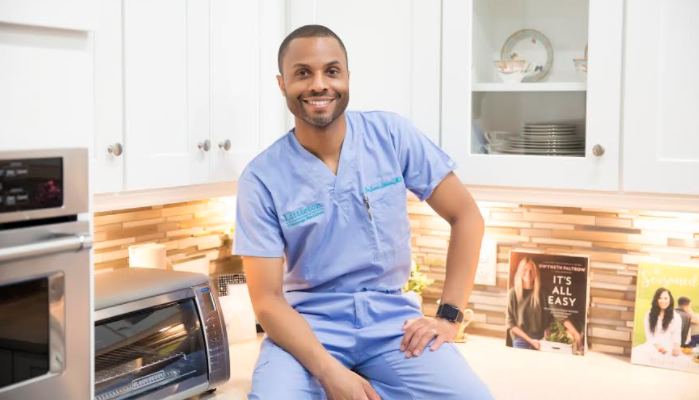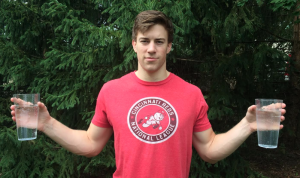
Today I have a special interview for you with a great new friend, Dr. Jason Littleton.
He’s a doctor, CEO, author, speaker, columnist, and so much more. Mainly he’s known as “America’s Energy Doctor,” and has been on The Dr. Oz Show—that’s big time.
What I appreciate about Dr. Littleton is he’s one of those guys who benefits everyone around him, making it look effortless. All you have to do is listen, and you’re going to walk away with some new wisdom or inspiration.
You’ll see what I mean in this interview.
Check it out below, and don’t forget to keep reading after the interview to see my key insights.
——
Brian: You’re super successful now. But it wasn’t always easy. Tell us about your difficult trial during the MCAT and how you got through it to become Dr. Littleton.
Dr. Jason: In a nutshell, I was on a journey to become a doctor. And one of the roadblocks that came up was when I walked out of the MCAT exam.
One of the things I realized is that when you’re going for anything, you’re going to realize what you do and don’t know about yourself that you need to change. You do this so you can become a better version of yourself.
In my case, studying for the MCAT was a whole lot different from studying in high school. In high school, you read a textbook and remember what you need for the test. Even in college, you’re learning things and you mainly memorize information to get to the next level.
But for the MCAT, there’s information there that you have to not just memorize, but retain for your future success as a medical student and as a physician.
One of the things I learned about myself is that I needed to retrain how I learned information. I needed to retrain how I studied and how I focused, so I could be better prepared when I went into that next MCAT exam.
Here’s the deal when you take a big exam like that. Sometimes there’s pressure to succeed. And I didn’t fully understand that pressure as well as I maybe should have understood.
So through self-reflection, understanding the things I did wrong, and staying motivated, I was able to go back and do the test again, and succeed. That was a difficult time that I overcame. But I never lost focus that I would be a successful doctor.
Brian: What are your overall thoughts on failure? Is failure permanent?
Dr. Jason: It’s both. Failure is a temporary thing for people who see the light at the end of the tunnel, when there’s no light. You have to have a vision for yourself. You have to be able to see it when no one else can see it. And when things in the natural don’t look like they’re going well, you still have to have a mental picture of where you’re going and that you can still get there.
For people who can do that, and everyone can do that, so for those willing to do that then failure is temporary.
For people who are not willing to see the greatness inside of them and are not willing to face difficult times and get through them, failure is permanent. Because these are the types of people who will quit, not continue on, not fight the obstacles, or embarrassment. Because sometimes people feel embarrassed when they fail.
So if you can get past the pride and the embarrassment, to see that mental picture of you on the other side, failure is temporary.
Brian: I know that you’re an energy expert. So what are three changes we can make in our lives to gain more energy throughout the day?
Dr. Jason: First, you should always start with breakfast. A lot of people skip that, but here’s the deal: Carbs are our fuel. That’s like our gasoline. So when we eat breakfast, we’re getting the carbs we need to fill our body with energy.
People shouldn’t ever avoid carbs. That’s like not putting gas in your car. You want to have elite carbs though, such as vegetables and fruit.
The other thing people should do is have snacks throughout the day. I always tell people to have six meals a day—breakfast, lunch, and dinner with three snacks in between. When you do that, you stay energized as you go through the day.
Next thing, people should avoid drinking caffeinated drinks. Sometimes people make a habit out of that and they use caffeinated drinks for energy. But they continue that until it’s something they rely on to feel energized.
But that’s not what you need. It hurts your health. It doesn’t make you feel as energized as you actually think. It’s a lot of commercialism.
So those three things, just from a natural aspect of diet and nutrition, will give you more energy.
And here’s one bonus from a mental perspective. People have to plan to go beyond where they think their end point is. For example, if people think at 5 PM their day ends because they got off work and they’re not prepared to go beyond that, their internal mental clock says we’re done working and let’s shut it down.
But I tell people to keep the throttle going. Don’t go home at 5, sit on the couch, and turn things off. Because when you do that, you get tired, it’s hard to start again, it’s hard to work at home, and it’s hard to be an entrepreneur outside of your job.
So I tell people to plan to work to at least 10 PM. When you do that, mentally you’re prepared to go longer than you originally thought was your end point. That’s how you can also have more energy and spring to your step during the day.
Brian: From your experience as a doctor, what’s one of the biggest misconceptions an average person has about living a healthy life?
Dr. Jason: I don’t want to lose anyone here, but sometimes people think that they have to work out to an extreme extent so that they feel like they’re in the best shape of their lives.
But I argue that how many football players and athletes live beyond 70? These are people who work out to an extreme extent to become real muscle-bound. And sometimes that extreme working out causes added stress on the body and inflammation that actually doesn’t cause us to have longevity.
Some of people who have been interviewed who lived to their 100s said the secret to longevity is moderation in exercise and diet. Some of the extremes in terms of fitness won’t take you to longevity.
I’m not saying don’t lift weights, don’t go running, don’t work out. I’m saying do it in moderation, don’t do it to an extreme.
Sometimes people will do it to an extent where they don’t feel good about themselves until they’re beating their body to the extreme. When you do that, it damages your health.
Brian: Walk us through how you got featured on Dr. Oz and what that experience was like on national TV?
Dr. Jason: First of all, I have a business coach, Dr. Stacia Pierce, who is world-renowned business coach who has helped me get engaged with people like a Dr. Oz and a Dr. Nandi.
Having a coach is paramount because you need someone, as an entrepreneur, that will push you beyond what you think you can do. I wouldn’t be where I am without my coach.
She pushed me to write my first book WellSpring: The Energy Secrets TO DO The Good Life. As I started marketing myself, people got wind of what I was doing.
And one day I received an email from the social producer from The Dr. Oz Show, asking me to talk about Dr. Oz’s magnesium grocery list and how I used it with my patients.
Of course I accepted that opportunity.
Brian: What’s your favorite book, fiction or nonfiction, and why?
Dr. Jason: One of my all time favorite books is Your Best Life Now by Pastor Joel Osteen. It’s a great book about making positive affirmations, believing in the favor of God, and really walking your faith out to be your best.
I think it’s a great book because when I read that it helped me through my journey of success as a physician.
There’s another book that’s really dear to my heart. It’s by Dr. James Pierce and it’s called The Success Secrets of Excellence. And it’s about how to be excellent in life, in your job, in your business, being on time for appointments, and how you look excellent because people treat you how you look.
Those two books, and my business coach Stacia Pierce, have made me the person I am today.
Brian: What’s your life mission?
Dr. Jason: My life mission is to help people find their passion and to use that so that they can live as healthy as possible, so that they can buy more time on this earth, and so they can carry it out.
Helping people do that enriches the world. Helping people live longer and be energized to do what they’re passionate about is a huge part of my purpose.
Brian: Where can Take Your Success readers go to learn more about you and your work?
Dr. Jason: People can go to my website: www.jasonmd.com. There they can find links to my Facebook, Instagram, and Twitter profiles.
And on my website they’ll be able to get to every social media site, book, and resource that I have.
——
What I learned is that Dr. Littleton has a clear vision for the world, his patients, and his life. That’s to live with passion.
And his passion empowers him to do his best work, regardless of the arena.
His passion to be a doctor carried him through his difficult time with the MCAT. His passion to help others live with energy improves the lives of his patients and the people around them. And his passion for entrepreneurship pushes him to continual business success.
I’m totally with him. There’s a 180 degree difference between someone who is pursuing their passion and someone who isn’t. You can see it in their day-to-day life, their mood, and often their eyes.
So I, and I know Dr. Littleton agrees, challenge you to find your passion. It’s the best thing for the people around you and you.


